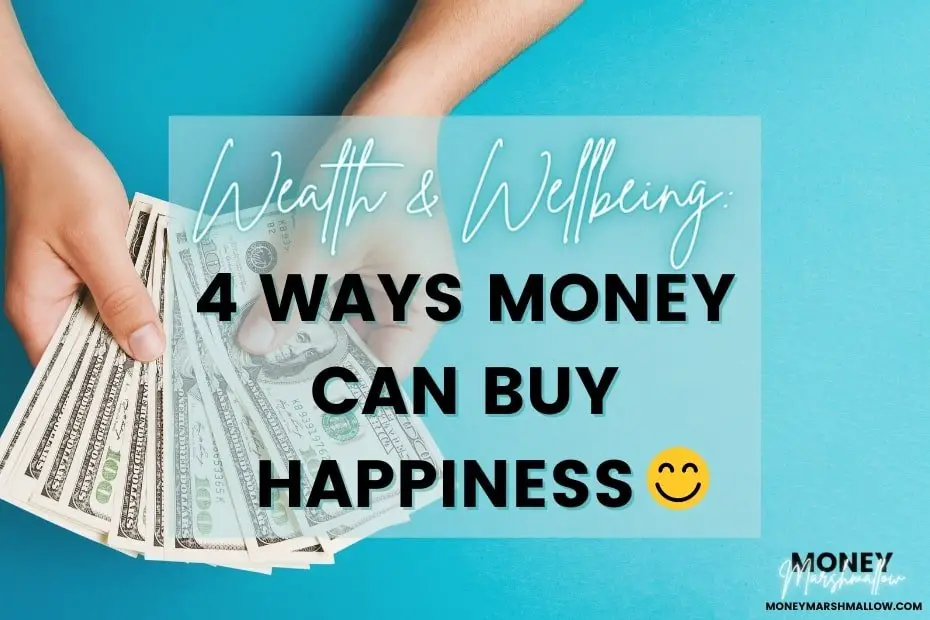I’m sure you have heard the age-old saying ‘money can’t buy happiness’ many times. But is this true?
While happiness is not an item you can buy from Amazon or your local corner shop, research indicates that money can actually buy happiness — but the key is how you spend it.
Accordingly to a famous study from 2010, money and happiness are related, but the relationship between the two is complex. For starters, it depends on how much money you have. The study suggested that people who are relatively well off don’t get a significant happiness boost from more money. When a household income rises above about $75,000 a year, more money doesn’t provide more emotional wellbeing.
However, a recent 2021 study indicates that more money can actually lead to more happiness even for those earning more, provided it’s spent on certain things. This said, here are four scientifically proven ways money can buy you happiness:
1. Buy time
In my article covering passive income strategies, I mentioned that time is our most valuable asset. If you agree with this, what I’m about to tell you next probably doesn’t come as a surprise: research suggests that when you spend your money to save time, you receive a boost in happiness.
In this experiment, people reported greater happiness if they used £30/$40 to save time rather than spending money on material goods. At the same time, the researchers say that stress over lack of time can have a detrimental effect on life satisfaction.
So if you want to buy happiness, consider spending your money to save time. A good way to do this is by paying someone else to do the time-consuming work that you don’t like. Hire someone to clean your house or to sort out your garden. Order food and have it delivered. Or take an Uber instead of public transport.
However, if you are trying to save money at the same time, be sensible about how much money you spend on these things. Try to find a good balance that works for you, and ultimately, makes you happy.

2. Spend your money on others
If you were given £20, would you rather spend it on treating yourself or spending on others such as giving to charity or buying a gift for a friend?
Many people think that spending money on themselves will make them happier than spending it on other people. However, evidence from various studies shows that this isn’t true. But why? Why is spending our money on others actually making us happier?
Psychologists say that this is partly because giving to others makes us feel good about ourselves. Secondly, it’s because spending money on others helps develop our social relationships. And people with stronger social ties are generally happier.
Just remember that this doesn’t mean that you can buy someone’s love or attention.

3. Spend money on small pleasures
According to research, buying many small pleasures makes you happier than buying a few big ones. The book The Myths of Happiness explains how researchers found that those who frequently treated themselves to low-cost indulgences, such as picnics or a coffee in a coffee shop, were happier with their lives. Other scientists have found that free or low-cost activities can yield small short-term boosts to happiness that accumulate little by little to produce a large impact on happiness in the long term.
This is explained by a phenomenon called hedonic adaptation. When you buy one big thing, such as designer shoes, you get a big happiness boost. However, after a few days or weeks that increase has disappeared because you’ve adapted and are taking your big purchase for granted. Now you have to wait for a long time until your next big purchase comes.
On the opposite, if you spend your money on small pleasures, each increase in happiness will be smaller than the one from the big purchase. However, the overall increase will be bigger.
Again, if you have long-term financial goals, such as buying your first home, make sure you find a suitable balance between small pleasures and saving for your goals.
Related: How to live a champagne lifestyle on a lemonade budget

4. Buy meaningful experiences
Although you may get a similar feel-good boost immediately after purchasing an experience or a thing, meaningful experiences more effectively increase happiness long-term. Research indicates that the thrill of buying material goods will pass quickly.
Part of the reason is that we get used to the happiness derived from material things quickly, whereas the memories from experiences live on. Interestingly, reminiscing about your experience doesn’t just give you joy during and after the experience but also provides more enjoyment in anticipation of it happening. For example, when you wait for a new car or TV, you may feel impatient. But when you anticipate an activity like travelling or parachuting, you likely feel excited.
However, this doesn’t mean buying things will never bring you pleasure. Meaningful life experiences are not always about spending money on travel or adventure. It can also be about buying things that can facilitate that experience.
For example, spending quality time with your family is a meaningful activity. And therefore, buying a home entertainment system, so the whole family could enjoy watching movies together, can be considered an experiential purchase.
Research by the University of Cambridge also shows that if you have a strong affinity for something, even if it was tangible, you can get a lot of happiness out of buying that thing. A good example of this can be a passion for cars or designer items. However, it’s important to understand why you are really buying it for. Are you buying it for your internal happiness or with the intent to impress others and feel accepted?

Questions to ask yourself before buying something
How can you know what you are about to spend money on will boost your happiness? To wrap up the above four ways money can buy happiness, ask yourself the following questions:
- Will this allow me to save time or spend more time with my family or friends?
- Can this help me to learn something new or improve a skill?
- Will this help me express myself or enhance who I am as a person?
- Does this make me happy even if others don’t like it?
When money doesn't buy you happiness
In my article The Marshmallow Test: 3 Science-Based Tips to Money Success I explained why high-income individuals are not always wealthy. This is due to a “lifestyle trap”. Meaning that when you are making more money, your expenses usually increase too.
For example, you may end up spending money on things like a bigger house or designer clothes. If this is the case, you probably don’t feel like you have enough money even when you are earning a substantial salary. Therefore, you are not necessarily any happier either.
Further to the above, happiness also depends on how much time you need to put into work to earn your money. If you have an annual salary of £100,000 but are working 70 hours a week and never have time to enjoy your money or do things you enjoy, is it worth it? In my opinion, no, it’s not. This is why I believe passive income and financial freedom are so important for both financial and emotional wellbeing.
Finally, keep in mind that no matter how you spend your money, you should avoid high-interest debt as it can be corrosive to your happiness.


I love the idea of paying someone to clean my house. Even better would be to have my own personal chef.
My husband and I both love to travel and believe that these experiences are worth spending $ on.
Thanks for your comment, Jolayne – I totally agree with you! I’m a travel enthusiast too and travelling was definitely my main “happiness-expense” pre-covid!
Honestly, ice cream is one of those things that makes me incredibly happy. 😂😬😍
But I agree with everything you said, especially about buying meaningful life experiences. I bought a motorbike over a year ago and it’s the best decision I ever made.
Thanks for your comment Laura! Who wouldn’t like ice cream haha!
I completely agree! I’ve always said that money can’t buy you happiness, but it can buy you freedom. Freedom can definitely bring you happiness!
Thanks Erin – 100% agree with you on freedom!